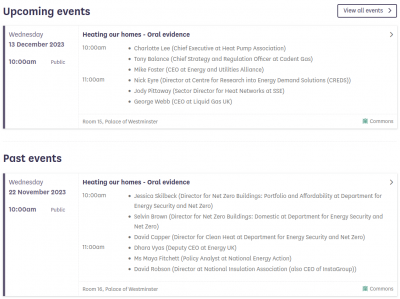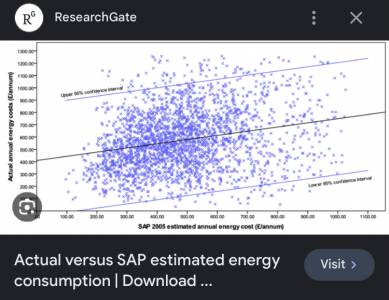Do ASHPs work with poor insulation?
This is a question about installing air to water ASHPs in buildings with poor insulation. The info I’ve read says the ASHP will work, just that it takes more kWh to reach desired room temp.
Is it as simple as that, or will the ASHP fail to reach desired room temp at all?
If the heat loss survey accounts for poor insulation and the HP is sized accordingly, should it work ok?
🤔
Hi. Your are correct. But it would be extremely expensive to run. Much better to invest in insulation first.
House-2 bed partial stone bungalow, 5kW Samsung Gen 6 ASHP (Self install)
6.9 kWp of PV
5kWh DC coupled battery
Blog: https://thegreeningofrosecottage.weebly.com/
Heatpump Stats: http://heatpumpmonitor.org/system/view?id=60
Hi there, thanks for the reply. I just wonder, though, if you take out cost (given high UK electricity prices) and just look at kW consumption whether an ASHP in a poorly insulated building is still more efficient than a gas boiler. Even if you only got a COP of 1.5, wouldn’t the former still be better than the latter?
@sentinam In terms of efficiency yes (you would get a lot better than 1.5 I would hope) but the problem is with the ratio of costs of Gas (or oil) to electricity. Gas is currently about 7.5p per kWh whereas electricity is about 30p per kWh. On those prices you would need a COP of 4 for cost parity.
There are people who have done what you suggest, but one I spoke to was finding he was using about the same number of kWh with his heat pump as he was with his old heating system. I suspected the problem was with the amount of heat loss during the nights due to his lack of insulation.
Until the government addresses the ridiculous charging system which tariffs the cheapest energy to produce as the most expensive to buy, this is always going to be a barrier to heat pump uptake I fear.
House-2 bed partial stone bungalow, 5kW Samsung Gen 6 ASHP (Self install)
6.9 kWp of PV
5kWh DC coupled battery
Blog: https://thegreeningofrosecottage.weebly.com/
Heatpump Stats: http://heatpumpmonitor.org/system/view?id=60
The cost and difficulty of insulating is also a barrier, I think. So much of the existing UK housing stock is poorly insulated and difficult/expensive to sort out.
I found a recent report (November 2023) from Glasgow Uni on barriers to HP adoption. The report gets a bit pseudy but the final conclusions and recommendations on pages 41-45 are easier reading, and include a suggested ‘decision-making framework local authorities might adopt to achieve a more precise and considered approach to domestic heat decarbonisation.’
Have a look at the investigation being run by the House Of Commons Select Committee on Energy into the topic of Heating our Homes.
They've just had one session of oral evidence on 22nd November, with another one scheduled for this coming week.
You can download the transcript of that evidence.
There are questions being asked of witnesses about insulation.
I've discussed these oral evidence sessions with the Clerk to the Committee.
You can still send in written evidence if any of the witnesses has stated something which needs correcting or supporting with additional facts/observations.
The line saying 'This inquiry is no longer accepting evidence' refers only to the deadline for submission of original written papers.
Oral witnesses can still be challenged.
Save energy... recycle electrons!
Interesting written submissions from a wide cross sections of organisations with different agendas. Some mention the option of moving from carrot to stick so that renewables become mandatory. Also in the Glasgow Uni report, there was a hint of means testing to determine level of Gov support.
You read that quickly @sentinam
Did you pick up the dry sense of humour from the Chair, Angus Brendan MacNeil MP (Outer Hebrides)? 😉
What the Committee hears too little of is evidence from ordinary members of the public.
The official bodies tend to file written submissions which follow a common pattern and are simply lines text.
How refreshing it must be when an individual respondent takes the trouble to include a photo.
It's unlikely that any Committee Members have hands-on experience of insulating their own house or trying to achieve the COP from their heat-pump which was specified in the prior household energy-survey. So it's really up to 'us' to tell them of our own perceptions.
For example, the quality of installation (both heat-pumps & insulation) is much more crucial than it was with gas boilers.
Parliament can make as many changes in law and policy as they like, but if the installers perform poorly, then much of the investment is wasted.
Save energy... recycle electrons!
Good that they are discussing EPCs and how they don't favour ASHPs. The whole EPC rating system is a joke at the moment - no training, no standards, and no consistency. I moved into a G rated house (score of 15 - lowest I've ever seen); yet it's cavity wall insulated, double-glazed, and lost insulation, just (was) heated by LPG boiler (with TRVs and programmer). House three doors away had a D rating, and heated by ancient electric storage heaters.
If it means so much (and the government want it to) then there needs to be standards, consistency, and checking.
Grant Aerona 3 10kW
My EPC experience was pretty poor. Over the years I’ve made loads of home insulation improvements - and I pointed them out to sap guy, who was to be fair, interested. At that time, perimeter wall insulation, retrofitted U=1.1 DG units, above head loft insulation…. Very interesting, but no paper trail or no place on the form to put it, so it goes in as ‘default assumed’. I’m going to guess diy gives ‘better than SAP’, while the ‘insulation performance gap’ gives the reverse - ie insulation done badly, but good paperwork.
The sap needs to be a more involved process, based on what is measureably there imho. Air tightness test please! Energy bills (kWh) please (like an odometer on a mot)! At present it’s an almost pointless box ticking excercise.
Attached a graph found from a quick google search showing not a lot of correlation between sap and reality:
Posted by: @mikeflthere needs to be standards, consistency, and checking
This subject isn't one of my strengths, but let me observe:
1: There is a PAS2035 standard which is intended to address retrofitting existing buildings.
Energy assessors should be trained and qualified to work to this standard.
2: SAP scores for new buildings are calculated for each individual dwelling using licensed computer software.
It produces a multi-page print-out with the version of the SAP accreditation which was used, and the licence number of the assessor on every page.
Too often a homeowner only gets to see the summary page which is effectively an EPC certificate.
The general public needs to be insisting on receiving a PDF of the multi-page document.
That will show if the inputs to the calculations were correct in the first place.
The version of the software is equally important.
The big national companies are members of the NHBC, who provide the building-control oversight and guarantee.
When a builder first registers the site (with a nominal £1 fee) the building regulations clock stops ticking.
The houses may now be built to the Building Control and SAP regulations which existed at that point in time.
A new Vistry estate being built close to me is being constructed to the 2006 version of the Building Regs, and SAP 2009.
They 'registered' the site with NHBC on 31st March 2014, six days before the SAP 2014 standard came into force.
They didn't actually buy the site until 15th October 2015. 🤫
I agree with @robl about the problem of self-installed work not being taken into account when calculating EPCs.
As a 'self-builder' I undertake work on my house within the 'Building Notice' scheme.
Each time I reach one of the points agreed with the inspector, I inform them and request a site visit.
They know full well that the quality of construction undertaken by self-builders is generally well above standard.
So they simply email to say "carry on, and notify us again when you've reached this next stage" which they specify.
Unfortunately, I like talking with building inspectors on site because they have a wealth of understanding about how to implement the trickier bits of construction.
So I now have to 'manufacture' an excuse to get them to attend!
It's simply unacceptable that an EPC doesn't reflect the care and attention to detail which a self-builder will have put into the installation of insulation (for example).
And yet ASHPs with high losses due to deficiencies in their installation by a professional MCS-accredited company are permitted to increase the EPC rating.
Bizarre!
These are the sorts details which the Commons Select Committee need to hear.
I already have four submissions accepted by them, three of which have been published via the Parliamentary library system.
I have included snippets from this RHH Forum in support of what I'm stating, including a paragraph from @editor 🙂
The other people who are currently receptive to energy-related 'briefings' being sent to them are PPCs (Prospective Parliamentary Candidates).
They are now gathering facts on which they will base the arguments in their campaigns during 2024.
I often send relevant unsolicited briefings to PPCs, particularly concerning major energy projects in the constituency they will contest.
They will usually share that information with colleagues of the same political 'flavour' in neighbouring constituencies.
Accessing PPCs is easier than MPs, who must remain with the Parliamentary rules and only communicate with their own constituents.
The 'guideline' I will suggest is this:
Never stray away from evidence and into political issues.
In a democracy, a politically active floating-voter is king.
Every PPC will want to maintain communication because they're still hopeful of gaining a vote!
Save energy... recycle electrons!
Posted by: @transparentHave a look at the investigation being run by the House Of Commons Select Committee on Energy into the topic of Heating our Homes.
By the way, this is available to watch on Parliament TV.
- 27 Forums
- 2,495 Topics
- 57.8 K Posts
- 441 Online
- 6,220 Members
Join Us!
Worth Watching
Latest Posts
-

Below is a better quality image. Does that contain all ...
By trebor12345 , 2 minutes ago
-
Sorry to bounce your thread. To put to bed some concern...
By L8Again , 4 minutes ago
-

@painter26 — they (the analogue gauges) are subtly diff...
By cathodeRay , 38 minutes ago
-

RE: What determines the SOC of a battery?
The answer from Fogstar was crisp. My hypothesis, su...
By Batpred , 1 hour ago
-

RE: Electricity price predictions
I am always impressed with how you keep abreast of so m...
By Batpred , 1 hour ago
-

RE: Setback savings - fact or fiction?
I fully understand your reasoning, same steady inputs s...
By cathodeRay , 1 hour ago
-
RE: Humidity, or lack thereof... is my heat pump making rooms drier?
@majordennisbloodnok I’m glad I posted this. There see...
By AndrewJ , 2 hours ago
-
RE: Testing new controls/monitoring for Midea Clone ASHP
@tasos and @cathoderay thanks. I have some history grap...
By benson , 3 hours ago
-
Our Experience installing a heat pump into a Grade 2 Listed stone house
First want to thank everybody who has contributed to th...
By Travellingwave , 4 hours ago
-

RE: Solis inverters S6-EH1P: pros and cons and battery options
Just to wrap this up here for future readers: The S...
By Batpred , 7 hours ago
-
RE: Struggling to get CoP above 3 with 6 kw Ecodan ASHP
Welcome to the forums.I assume that you're getting the ...
By Sheriff Fatman , 7 hours ago
-
RE: Say hello and introduce yourself
@editor @kev1964-irl This discussion might be best had ...
By GC61 , 9 hours ago
-

RE: Oversized 10.5kW Grant Aerona Heat Pump on Microbore Pipes and Undersized Rads
@uknick TBH if I were taking the floor up ...
By JamesPa , 23 hours ago
-

RE: Getting ready for export with a BESS
I would have not got it if it was that tight
By Batpred , 1 day ago
-
RE: Need help maximising COP of 3.5kW Valiant Aerotherm heat pump
@judith thanks Judith. Confirmation appreciated. The ...
By DavidB , 1 day ago
-

RE: Recommended home battery inverters + regulatory matters - help requested
That makes sense. I thought better to comment in this t...
By Batpred , 1 day ago
-
Bosch CS5800i 7kW replacing Greenstar Junior 28i
My heat pump journey began a couple of years ago when I...
By Slartibartfast , 1 day ago
-

RE: How to control DHW with Honeywell EvoHome on Trianco ActiveAir 5 kW ASHP
The last photo is defrost for sure (or cooling, but pre...
By JamesPa , 1 day ago
-

RE: Plug and play solar. Thoughts?
Essentially, this just needed legislation. In Germany t...
By Batpred , 1 day ago
-
RE: A Smarter Smart Controller from Homely?
@toodles Intentional opening of any warranty “can of wo...
By Papahuhu , 1 day ago
-
RE: Safety update; RCBOs supplying inverters or storage batteries
Thanks @transparent Thankyou for your advic...
By Bash , 1 day ago
-
RE: Air source heat pump roll call – what heat pump brand and model do you have?
Forum Handle: Odd_LionManufacturer: SamsungModel: Samsu...
By Odd_Lion , 1 day ago
-
RE: Configuring third party dongle for Ecodan local control
Well, it was mentioned before in the early pos...
By F1p , 2 days ago




